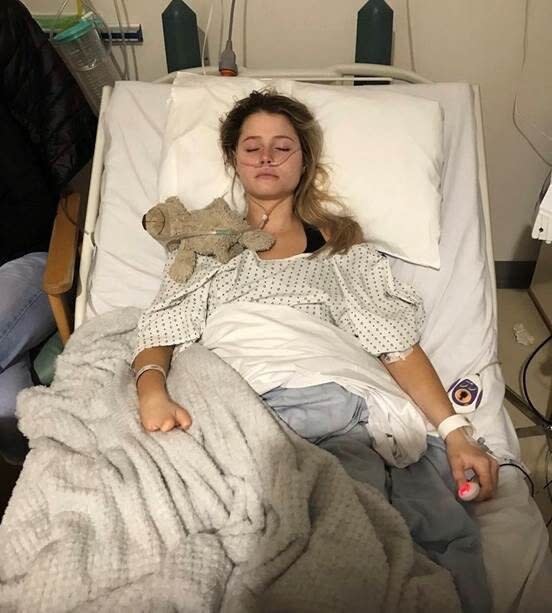The Traitors’ Mollie Pearce: ‘I was told my colon could erupt at any moment’

I’d had a vague idea of what ulcerative colitis was since I was little, as my dad had suffered from it since his forties. But when I noticed blood on a trip to the toilet when I was 11, I thought it was my period. I had no idea that it was the first sign that I’d inherited the condition too and that it was about to overturn my life.
Looking back now, I feel so stupid but I remember calling my mum and telling her that my period had started and her saying that it definitely wasn’t my period and looked worrying.
The blood was actually in my stool and my bowel movements became increasingly erratic over the following months. I started going to the toilet a lot more, was suffering from diarrhoea and losing a lot of blood. At my worst, I was struggling to make it to the bathroom on time and soiling myself.
My parents of course took me to the doctor and, despite my mum explaining that my dad had ulcerative colitis and I probably did too, it was really hard to get diagnosed.
Ulcerative colitis is a type of inflammatory bowel disease (IBD) that causes ulcers to develop in your colon or rectum, or both. They bleed and release pus, which is then passed in your stool. It causes you to pass stools much more often, suffer diarrhoea and feel very tired. The exact cause isn’t known but it’s thought to be caused by a problem with the immune system and can run in families.
It usually requires a colonoscopy to diagnose but my doctor didn’t order, in my experience, doctors don’t like performing them on children, so I went undiagnosed and untreated for eight months.
On one trip to the doctors, ahead of my Year 6 school camp, I was told I simply had a virus. I begged my mum to let me go on the trip with my school friends, as the doctors had said it would get better and I would be fine.
But I wasn’t fine. I went really downhill and became so poorly that I passed out in the shower when I got home. My parents rushed me to A&E and I spent the next two weeks in hospital. I finally had the colonoscopy and was diagnosed with ulcerative colitis.
However, despite the comfort of a diagnosis and starting treatment, none of the typical medicines that can reduce symptoms made mine any better.
My quality of life got worse as I entered my teens and went to secondary school, as I started missing out on sleepovers, parties and nights out.
I remember once spending the night at a friend’s house and rushing to the toilet the next morning and not quite getting there in time. It was so humiliating, especially being a girl in my teens and having to tell my friend that “I’m so sorry but this has happened”. That experience just put me off sleepovers as it built up so much anxiety around them.
My mental health took a massive hit – I would have a panic attack if I wasn’t near a toilet and I felt isolated as it was so hard to communicate what was going on.
This was probably one of the hardest ages for me because it all felt so unfair. Adding to that, I was born without my right hand as well. Doctors don’t know why – it’s completely unrelated to my ulcerative colitis. It’s just a double whammy that I’ve been saddled with.
When I started college at 16, my anxiety around my bowels was so bad that I struggled to get into my car to make the drive to classes. At the time, I felt like my condition was so embarrassing – I feel bad about that now, because it shouldn’t be, but it’s definitely how I felt at the time.

Throughout all of this, I was also spending up to a week in hospital during flare-ups. These can last days, weeks or months, when symptoms are especially bad. Mine would occur every six months or so and were often triggered by stress. During these times, I would go to the toilet up to 25 times a day, lose control of my bowels and suffer crippling fatigue as my body wasn’t absorbing enough nutrients from the food I was eating.
I knew I was running out of options. Doctors told me when I was 15 that I would eventually need surgery to have a stoma fitted. The procedure involves diverting the bowel through an opening in the tummy, which is hooked up to a pouch that collects stools. I was adamant that I wouldn’t get a stoma because I really thought it would be the end of the world.

It’s difficult to open up about your bowels – it was, and still can be, a taboo subject. Ulcerative colitis is an invisible illness, so it’s hard for other people to appreciate how bad it really is, but my friends really rallied around me as we got older as they understood it more. On my 18th birthday we were out clubbing and between them they had a spare pair of pants, a change of clothes and extra toilet roll in their bags to help me clean myself up if anything happened.
When I was hospitalised shortly afterwards due to a particularly bad flare-up, doctors told me they were really worried that my colon was going to erupt. It’s a complication of ulcerative colitis that can lead to septicemia. But I was so stubborn and said I’d rather die than have a stoma.
I went home with some medication that didn’t work for me and I ended up back in hospital about six months later and I was just done. I’d been fighting my body for seven years and suffered so much anxiety and wasn’t able to live my life. Not long after being admitted, I was having the surgery. Waking up with a stoma was really scary but very quickly I knew I’d done the right thing.
Soon after I came out of hospital, my dad took me for a drive-through takeaway, which I would have been so anxious about before. I would have felt trapped in the car and worried about where the nearest toilet was. But now, I had no anxiety because I knew I wouldn’t need to go.
My experience of ulcerative colitis is nothing like my dad’s (he is largely in remission and never had a stoma fitted), but it was so nice that we understood each other. While he wasn’t diagnosed until midlife, he still had the pressure of managing his symptoms around work.
Then, two days after that trip with my dad, I put on a pair of jeans that I didn’t think I was going to be able to wear with my stoma. My mindset completely shifted and I knew I was starting to get my life back.
I started calling my stoma “Sid” and now when my stoma makes noise, which it frequently does, I just make light of it and say “sorry, that was Sid”. It makes things less embarrassing and easier to laugh it off.
I still have to go to hospital sometimes as my ulcerative colitis is concentrated in my rectum, so I sometimes pass a little bit of blood and mucus.
My rectum was left behind during surgery, in case I could have the procedure reversed in the future if my symptoms calmed down. But I won’t ever reverse it. It wouldn’t be worth it, especially when my symptoms are still in my rectum. My life has become so much better from having Sid – why fix something that’s not broken?

I’m now 22 and live a completely normal life, surrounded by great friends, family and my boyfriend, who I’ve been with for three years. Growing up without my hand, my mum had always told me that if people don’t like it, then you’ve sieved a bad person out of your life and I’ve taken that on board with my stoma too. I was really worried about getting a partner but my boyfriend doesn’t care about it – he doesn’t even notice.
I’ve been posting about ulcerative colitis on social media for years but I’ve definitely become even more open about it over time. I’ve lost that embarrassment and come out of my shell.
When the opportunity came up to go on BBC One’s The Traitors, I knew it would be great. It involves players who are “faithfuls” trying to eliminate the “traitors” from the group. I didn’t go into it thinking that it would be a platform to talk about ulcerative colitis, but I knew it would be a big deal to see someone on TV who has a stoma and limb difference doing the same challenges as everyone else.
I’ve had lovely messages since the show aired, saying it’s changed people’s lives, just seeing that little bit of representation on TV.
Before the show, I was a healthcare assistant but I’ve not been doing that since the finale because I’ve been so busy advocating and doing social media.
I’m now just taking things as they come, including raising awareness for this year’s World IBD Day (Sunday, May 19), which focuses on improving access to diagnoses and treatment. The campaign is in association with Celltrion, which is developing treatments for IBD, among other conditions.
The campaign takes some of its inspiration from the Where’s Wally? series of books and it’s a really fun way to educate people about ulcerative colitis, Crohn’s disease and IBD and shows how someone with ulcerative colitis can so easily blend in and hide their symptoms.
I’m now excited for my holiday in Turkey. Before I had Sid fitted, holidays would become stressful events as I’d be worried about having a flare-up. Now, I’m not stressed at all. It’s so nice to plan things and know you can do them.
As told to Emily Craig

